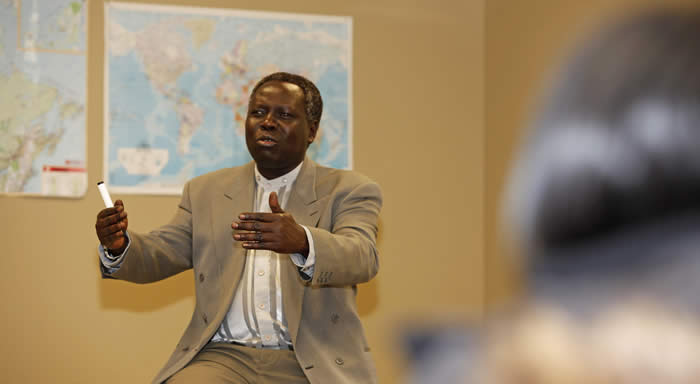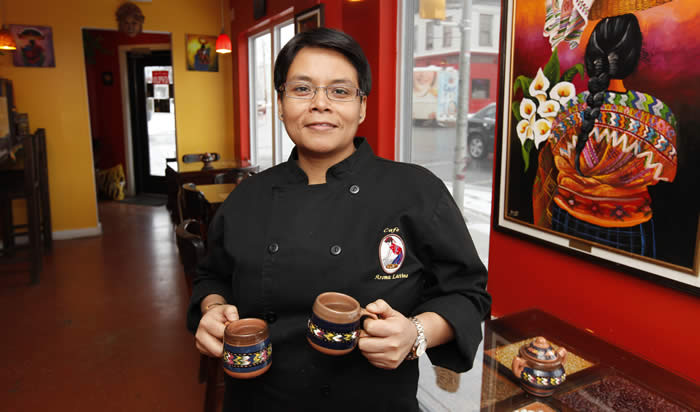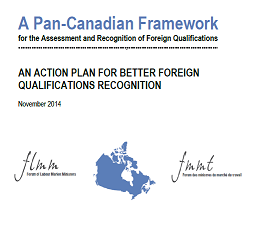
International Qualifications Recognition
Nova Scotia works provincially and nationally to support the recognition of the experience and education of people trained outside Canada. This work is guided by a national framework called the Pan-Canadian Framework for the Assessment and Recognition of Foreign Qualifications.The Framework is the responsibility of the Department of Labour, Skills and Immigration (Recognition of Prior Learning and Labour Mobility and Immigration and Population Growth)
These two departments work together to support efforts in regulated occupations in this province. Their job is to make sure that our labour market is fair and competitive and that immigrants can use their education, skills, and work experience to benefit themselves and contribute to the prosperity of this province.
 |
 |
 |
What is International Qualification Recognition?
The diagram below from the Pan-Canadian Framework for the Assessment and Recognition of Foreign Qualifications shows the steps ...see more
Qualifications = Credentials + Competencies + Experience
You will need to have your qualifications assessed if your occupation is regulated, and your training is from outside Canada. Every regulated occupation has its own process for assessment. Some provincial regulatory bodies do the assessments; others rely on a third party assessor or a national regulatory body.
To get started, contact the provincial regulatory authority for your occupation to find out what steps you need to take to get your qualifications assessed.
Assessing Credentials
Credentials are education/training records, diplomas and certificates, as well as other occupation-related documents. Credentials assessment is usually the first step towards getting a licence or certificate to practice in a regulated occupation. A good source of general information about credentials assessment is the Canadian Information Centre on International Credentials but remember – always contact the regulatory authority for your occupation first! If you work in a non-regulated occupation, you don’t necessarily need to get your credentials assessed. However, it may help an employer to understand your qualifications in relation to Canadian training.
Assessing Competencies
Competencies are the skills, abilities, and knowledge you need to practice in your field. To assess your competencies, regulatory authorities may use one of more of the following tools
- written examinations
- oral examinations
- practical skills assessments
- language tests
- structured interviews
- portfolio assessments
- supervised work periods
- other methods
Funding to Develop Processes for International Qualification Recognition (IQR)
The International Qualifications Recognition Funding Program aims to strengthen IQR and recognition of prior learning (RPL), in Nova Scotia. Organizations can apply for funding to develop tools, programs, and services that help skilled immigrants get their qualifications assessed and recognized so they can work in their chosen fields. Funding is available to regulatory authorities, agencies that work with immigrants, educational institutions and other organizations. Proposals supported by a multi-stakeholder work group or partnerships, are considered strongly.
For details on how to apply, go to Funding Opportunities.
Do you have questions?
If you have questions about how to have your qualifications recognized, or how to get a licence to practice in your field in Nova Scotia, please contact the regulatory authority for your occupation. You may also want to contact Immigrant Services Association of Nova Scotia (ISANS) at 902-423-3607.
If you have questions about immigrating to Nova Scotia, please contact the Nova Scotia Office of Immigration or refer to Nova Scotia Start.
For general questions on IQR, please contact Nova Scotia's Labour Mobility Coordinator at 1-877-466-7725 or email: labourmobility@novascotia.ca
Return to RPL and Labour Mobility Main Page
News & Events
The 2025-2026 RPL/IQR Funding Programs Call for Proposals is now closed.
